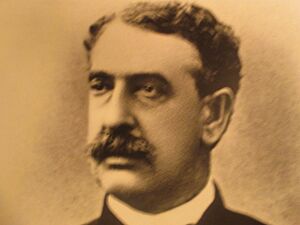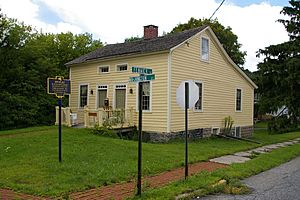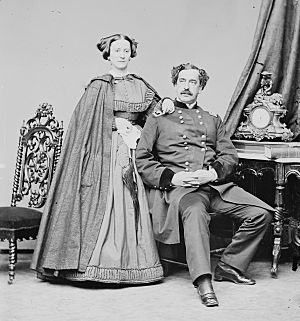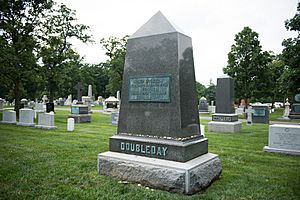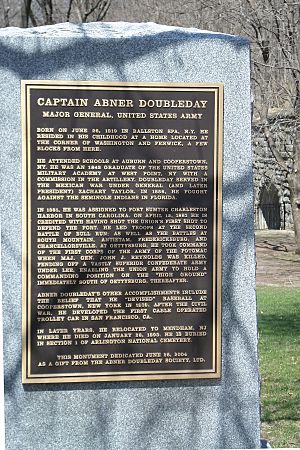Abner Doubleday facts for kids
Quick facts for kids
Abner Doubleday
|
|
|---|---|
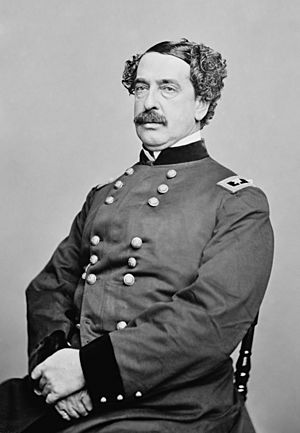
Doubleday, c. 1855-65
|
|
| Born | June 26, 1819 Ballston Spa, New York, US |
| Died | January 26, 1893 (aged 73) Mendham, New Jersey, US |
| Place of burial | |
| Allegiance | United States Union |
| Service/ |
United States Army Union Army |
| Years of service | 1842–1873 |
| Rank | |
| Commands held | I Corps 35th U.S. Infantry 24th U.S. Infantry |
| Battles/wars | Mexican–American War Third Seminole War American Civil War American Indian Wars |
Abner Doubleday (June 26, 1819 – January 26, 1893) was an important officer in the United States Army. He became a major general for the Union Army during the American Civil War. He is famous for firing the first shot to defend Fort Sumter, which was the first battle of the war.
Doubleday also played a key role in the early fighting at the Battle of Gettysburg. After the war, he got a patent for the cable car system that is still used in San Francisco. Later in his life, he was a leader in the Theosophical Society.
Many years after he died, some people claimed that Doubleday invented the game of baseball. However, historians have shown that this claim is not true.
| Top - 0-9 A B C D E F G H I J K L M N O P Q R S T U V W X Y Z |
Early Life and Military Start
Abner Doubleday was born in Ballston Spa, New York, on June 26, 1819. His family had a history of serving in the military. His grandfathers fought in the American Revolutionary War and the War of 1812.
Abner spent his childhood in Auburn, New York. Later, he went to a private high school in Cooperstown. He worked as a surveyor and engineer for two years. In 1838, he joined the United States Military Academy at West Point. He graduated in 1842 and became a second lieutenant. In 1852, he married Mary Hewitt.
Early Commands and Fort Sumter
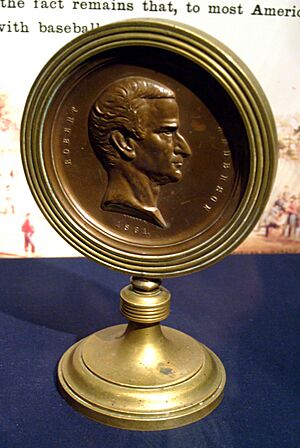
Doubleday served in the Mexican–American War (1846–1848) and the Seminole Wars (1856–1858). By the start of the Civil War, he was a captain at Fort Sumter in Charleston Harbor.
On April 12, 1861, Confederate forces attacked Fort Sumter. Doubleday aimed the cannon that fired the first return shot. This was the start of the Civil War. He later called himself the "hero of Sumter" because of his role.
Leading Troops in Virginia
Doubleday was promoted to major in May 1861. He commanded artillery units in the Shenandoah Valley. In 1862, he became a brigadier general. His first major combat was during the Northern Virginia Campaign.
Before the Second Battle of Bull Run, Doubleday showed great initiative. He sent his regiments to help another brigade against a larger Confederate force. His men fought bravely, even though they were outnumbered. He later took command of his division and helped cover the Union Army's retreat.
Doubleday continued to lead his division in major battles. At Antietam, he led his men into intense fighting. He was described as a "gallant officer" who was "remarkably cool" under fire. He was injured when an artillery shell exploded near him. For his bravery at Antietam, he was promoted to lieutenant colonel. In March 1863, he became a major general.
Gettysburg: A Defining Moment
The Battle of Gettysburg began on July 1, 1863. Doubleday's division was one of the first to arrive and support the Union cavalry. Early in the battle, his corps commander, Major General John F. Reynolds, was killed. Doubleday quickly took command of the entire corps.
His troops fought very well that morning. They held off much larger Confederate forces for five hours. This was one of Doubleday's best performances during the war. However, his corps suffered heavy losses and had to retreat through the town of Gettysburg.
On July 2, Major General George G. Meade, the commander of the Army of the Potomac, replaced Doubleday. Meade put a more junior officer in charge of Doubleday's corps. This was very upsetting for Doubleday, and he held a grudge against Meade. Despite this, Doubleday continued to fight well for the rest of the battle. He was wounded in the neck on the second day.
Doubleday's staff called him "Forty-Eight Hours." This nickname was a compliment. It meant he was thoughtful and careful in his decisions, not reckless.
Service in Washington
After Gettysburg, Doubleday took on administrative duties in Washington, D.C. He oversaw courts-martial, which gave him legal experience. His only return to combat was helping defend Washington against a Confederate attack in 1864.
While in Washington, Doubleday remained a strong supporter of President Abraham Lincoln. He even rode with Lincoln on the train to Gettysburg for the famous Gettysburg Address.
After the War
After the Civil War ended in 1865, Doubleday left the volunteer service. He returned to his regular army rank of lieutenant colonel. In 1867, he became a colonel.
From 1869 to 1871, he was stationed in San Francisco. There, he received a patent for the cable car railway system. This system is still used in San Francisco today. He retired from the army in 1873.
Doubleday spent much of his later life writing. He published two important books about the Civil War: Reminiscences of Forts Sumter and Moultrie (1876) and Chancellorsville and Gettysburg (1882).
Theosophy
In 1878, Doubleday became an important member of the Theosophical Society. This was a group that studied different religions and philosophies. When the society's founders moved to India, Doubleday became the president of the American branch.
Death
Abner Doubleday died from heart disease on January 26, 1893, in Mendham Township, New Jersey. His body was buried in Arlington National Cemetery in Virginia.
The Baseball Myth
Abner Doubleday is most widely known for something he probably didn't do: invent baseball. In 1908, 15 years after his death, a group called the Mills Commission claimed that Doubleday invented the game in Cooperstown, New York, in 1839.
However, baseball historians have shown that this claim is a myth. Here's why:
- Doubleday never said he invented baseball during his lifetime.
- His obituary in The New York Times didn't mention baseball at all.
- At the time of the supposed invention, Doubleday was a student at West Point.
- The main person who told the Mills Commission about Doubleday and baseball was not very reliable.
Despite the lack of proof, Cooperstown, New York, became the home of the National Baseball Hall of Fame and Museum in 1937. Some believe that Doubleday, as a high-ranking officer, may have helped spread the game by providing bats and balls to soldiers during the Civil War. This could have helped make baseball a national sport.
Honors and Namesakes
There are several places and things named after Abner Doubleday:
- A monument to Doubleday stands at Gettysburg, built by his men and admirers.
- A 7-foot tall monument is at Arlington National Cemetery where he is buried.
- Doubleday Field is a baseball stadium in Cooperstown, New York, near the Baseball Hall of Fame. It hosts special baseball games.
- The Auburn Doubledays are a summer baseball team in his hometown of Auburn, New York.
- Doubleday Field at the United States Military Academy at West Point is named in his honor.
- The Abner Doubleday Little League and Babe Ruth Fields are in his birthplace, Ballston Spa, New York.
- A monument to Doubleday was put up in Iron Spring Park, Ballston Spa, in 2004.
See also
 In Spanish: Abner Doubleday para niños
In Spanish: Abner Doubleday para niños
- List of American Civil War generals (Union)
- William Webb Ellis, sometimes apocryphally credited with inventing rugby football


